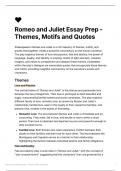♥️
Romeo and Juliet Essay Prep -
Themes, Motifs and Quotes
Shakespeare's Romeo and Juliet is a rich tapestry of themes, motifs, and
quotes that together create a powerful commentary on the human condition.
The play explores themes of love and passion, fate and destiny, the power of
language, duality, and identity. It employs motifs of light and dark, celestial
imagery, and nature to complement and deepen these themes. Embedded
within the play's dialogue are memorable quotes that encapsulate these themes
and motifs, providing insightful commentary on the narrative's events and
characters.
Themes
Love and Passion
The central theme of "Romeo and Juliet" is the intense and passionate love
between the two protagonists. Their love is portrayed as both beautiful and
tragic, transcending familial hatred and social constraints. The play explores
different facets of love: romantic love, as shown by Romeo and Juliet's
relationship; familial love, seen in the loyalty to their respective families; and
platonic love, evident in the bonds of friendship.
Romantic Love: The love between Romeo and Juliet is immediate and all-
consuming. They meet, fall in love, and decide to marry within a short
period. Their love is idealized and depicted as pure and powerful enough to
defy societal norms.
Familial Love: Both Romeo and Juliet experience conflict between their
loyalty to their families and their love for each other. The feud between the
Montagues and Capulets serves as a barrier to their relationship,
highlighting the tension between individual desires and family obligations.
Fate and Destiny
Fate and destiny play crucial roles in "Romeo and Juliet," with the concept of
"star-crossed lovers" suggesting that the characters' lives are governed by a
Romeo and Juliet Essay Prep - Themes, Motifs and Quotes 1
, predestined fate. Throughout the play, the characters make choices that lead to
their inevitable end, raising questions about free will and the influence of fate.
Predestination: From the outset, the prologue introduces the idea that
Romeo and Juliet are doomed by fate. This sense of inevitability permeates
the play, with numerous references to omens, dreams, and prophetic
statements.
Free Will: Despite the strong presence of fate, the characters' actions and
decisions significantly impact the plot. Romeo and Juliet's choice to pursue
their love, Friar Laurence's plan, and the miscommunications that follow
highlight the tension between fate and free will.
The Power of Language
Language plays a powerful role in "Romeo and Juliet," both as a means of
expressing love and as a tool for deception and persuasion. Shakespeare uses
poetic language, wordplay, and rhetorical devices to convey the depth of
emotion and the complexity of the characters' experiences.
Expressing Love: The lovers' dialogues are rich with metaphors, similes,
and sonnet forms, illustrating the beauty and intensity of their love. Their
exchanges are filled with poetic language that elevates their relationship
above the mundane conflicts around them.
Deception and Persuasion: Characters use language to manipulate and
deceive. For instance, Juliet's ability to play with words allows her to
navigate her conversations with Paris and her parents. Friar Laurence uses
language to persuade Romeo and Juliet to follow his plans, and the Nurse
uses it to communicate and miscommunicate vital information.
Duality
The theme of duality is prevalent in "Romeo and Juliet," manifesting in
contrasts such as love and hate, youth and age, life and death. These opposing
forces drive the narrative and underscore the complexity of human experience.
Love and Hate: The intense love between Romeo and Juliet is set against
the backdrop of the intense hatred between their families. This duality
emphasizes the destructive power of hate and the redemptive power of
love.
Youth and Age: The play contrasts the impetuosity and passion of youth
with the caution and pragmatism of age. Romeo and Juliet's youthful
Romeo and Juliet Essay Prep - Themes, Motifs and Quotes 2





